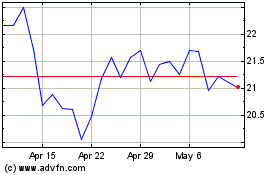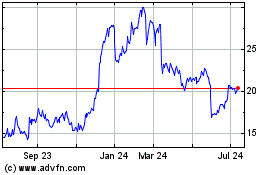Wireless Carriers to Firm Up Prices -- WSJ
February 09 2018 - 3:02AM
Dow Jones News
Sprint and T-Mobile indicate coming curb on discounting after
failed bid to combine
By Drew FitzGerald
This article is being republished as part of our daily
reproduction of WSJ.com articles that also appeared in the U.S.
print edition of The Wall Street Journal (February 9, 2018).
Cheap wireless plans might be harder to find this year.
The two most aggressive U.S. wireless carriers, Sprint Corp. and
T-Mobile US Inc., are signaling they will scale back discounting
this year after a failed attempt to combine their businesses.
Sprint, the No. 4 carrier by subscribers, said last week that it
would only chase new customers it considers profitable. No. 3
T-Mobile said Thursday it will also be more selective with the
deals it offers as it focuses on boosting cash flow while still
expanding its customer base.
"We think our shareholders are looking for both. They don't want
a trade-off," T-Mobile Chief Operating Officer Mike Sievert said in
an interview. "In any given quarter, we could choose to grow more
than we grow."
T-Mobile's more cautious stance showed in its outlook for the
year. The company said it plans to add two million to three million
postpaid customers in 2018, a step back from the 3.6 million it
gained last year.
The forecast "takes into account our desire to balance growth
and profitability," Chief Financial Officer Braxton Carter said in
a conference call with analysts, adding that T-Mobile's push into
rural areas would provide enough new sign-ups to "afford us the
opportunity to be less promotional in existing markets."
The moves come after both companies in November abandoned plans
to merge after months of talks. The aborted consolidation attempt
meant the U.S. will continue to have four nationwide wireless
carriers vying for customers' wallets, at least for the foreseeable
future.
The market leaders, Verizon Communications Inc. and AT&T
Inc., have responded to smaller rivals' promotions by offering
unlimited data plans, which muted an important marketing message
for T-Mobile. AT&T has also hawked bundles of its wireless
plans with television services it owns.
There were signs earlier last year that the wireless industry
might dial back its aggressive pursuit of new customers. Carriers
decided to avoid offering free iPhones to customers trading in old
models after maker Apple Inc. released even more expensive devices.
Sprint Chief Executive Marcelo Claure said at the time he would
prefer that manufacturers pick up more of the tab for customers'
hardware.
The plateauing prices come a year after promotions became so
aggressive the Federal Reserve said falling wireless prices might
have contributed to low inflation.
Mr. Claure recently said the company won't act as aggressively
when customers' promotional offers expire because the service's
quality is improving.
"We're going to have a lot of room to increase our price of
unlimited to get to similar prices as Verizon and AT&T in the
future," the Sprint CEO said last week in a call with analysts.
"You get that by having an amazing network."
This wouldn't be the first time wireless companies have promised
investors they would be more judicious with promotions, only to
fold when competition heats up.
AT&T last year offered a buy-one-get-one free iPhone
promotion that added to costs but helped fuel a
stronger-than-expected gain of 329,000 postpaid phone customers.
Wireless companies tend to prefer those subscribers who pay after
using monthly service, rather than ahead of time, because they tend
to stay customers for longer.
Ryan Knutson contributed to this article.
Write to Drew FitzGerald at andrew.fitzgerald@wsj.com
(END) Dow Jones Newswires
February 09, 2018 02:47 ET (07:47 GMT)
Copyright (c) 2018 Dow Jones & Company, Inc.
SentinelOne (NYSE:S)
Historical Stock Chart
From Mar 2024 to Apr 2024

SentinelOne (NYSE:S)
Historical Stock Chart
From Apr 2023 to Apr 2024
